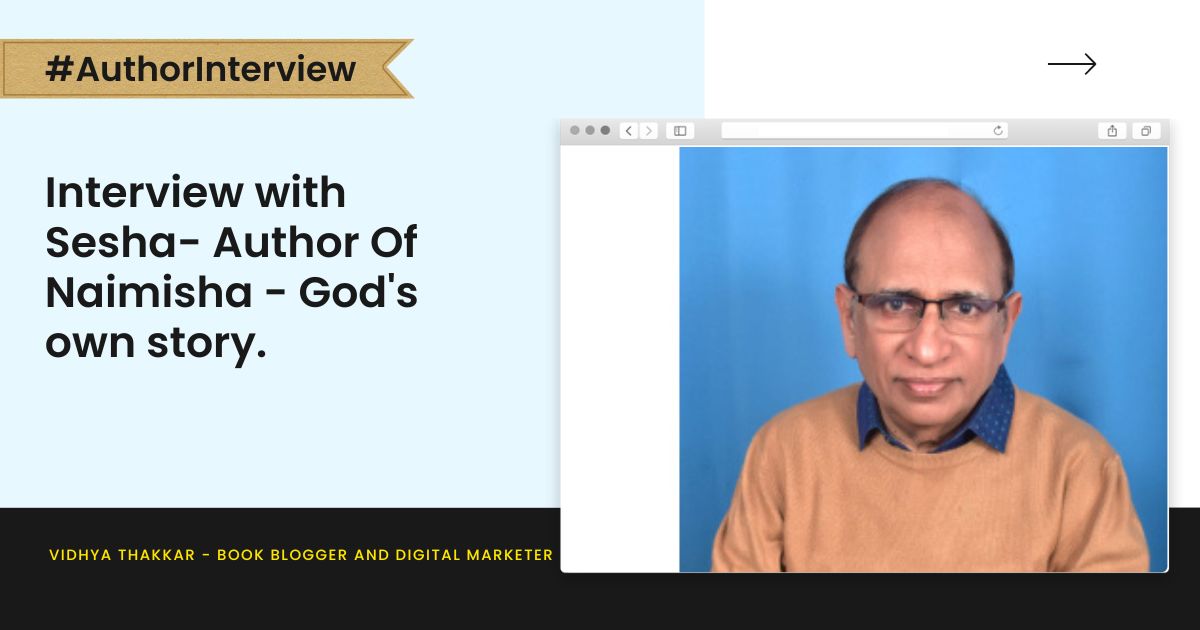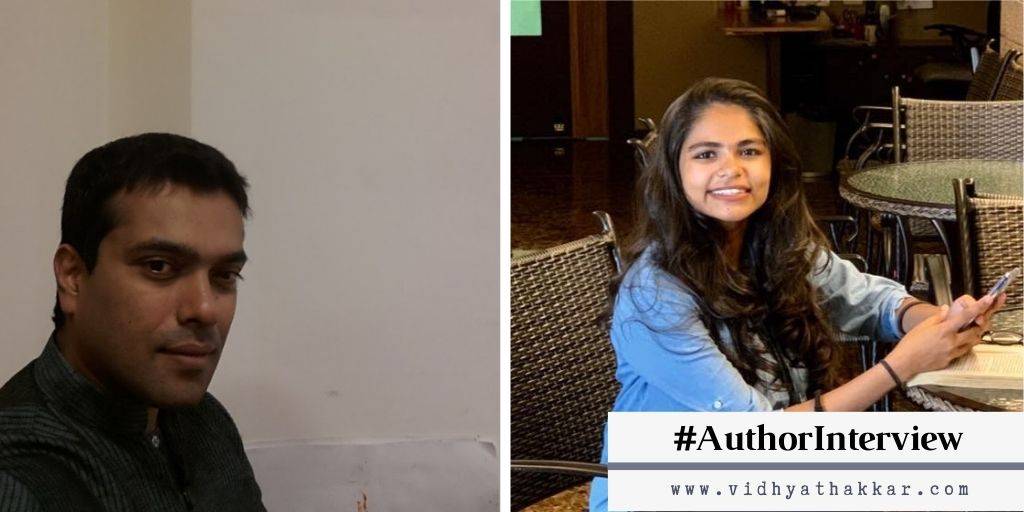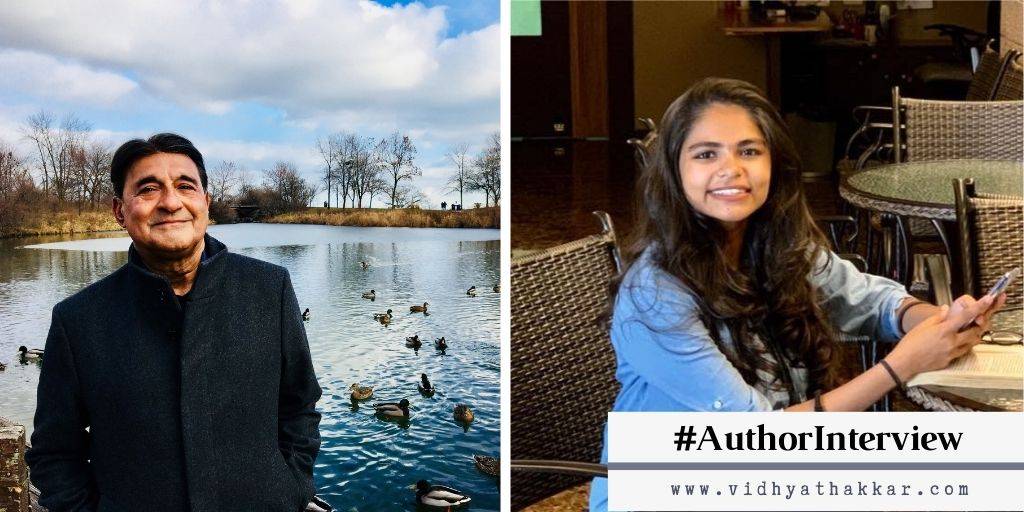About The Author
Sesha is a first-time author who ventured to publish this work at an age most writers might call it a day. The task took him about five years to complete, post his retirement from a nationalized bank. Though the idea for the story germinated and fermented in his brain a few years earlier. Epics, and more so, Mahabharata, has always intrigued him since childhood, and it made him read those stories again and again. His desire to retell the story of Shri Krishna, who
is the central character in the two great epics, in his own way led to his first book.
Also Read: Naimisha -God’s Own Story by Sesha – Book Review
Interview
1. Tell us about the idea behind the book.
The idea behind the book is to combine the story of Mahabharata and Bhagavatam(Dasama Skanda) to come up with a complete story of Srikrishna and Pandavas. Besides, the book also contains the story of a few fictional characters who lived as contemporaries of these epic characters. Whereas the life stories of epic characters and their every action are known to all, t readers will read the stories of these unknown characters for the first time. So, it is not just the story of epic, but how it is perceived by some people at that point in time. The conversations, discussions and debates among these characters will run as a parallel track without disturbing the original story with an idea to make the readers think about the epic and not read it just as they read a story. If you want me to summarise, the idea behind the book is to make the readers think and enjoy the various incidents of the epic.
2. How much time did it take in the process of writing?
If you are asking about the story plot, it was crystallised long back, I exactly can’t say when. Maybe a few years before I decided to write. The actual time lag between my start date and gave the script of the first part is about five to six years. I do not say I have completely used this period to write, but some thoughts always occupied the book all through this period. The process of writing the whole book was completed much before the first part was released, but the editing of the balance is still under process. Actually, as I changed my original script substantially while editing, I can not say the writing is completed until it goes to the publisher.
3. What did the process of writing this book teach you?
I began writing this story thinking that I know a lot about the subject being an active reader of books, including mythological stories, since my childhood. I was confident about what I knew. The process of writing taught me that what I know is sometimes inaccurate or incomplete, and there is a large portion of the information as well as the finer details that I don’t know. I was humbled by the depth of these epics, which are interconnected. The various references I had searched and studied taught me new stories hitherto unknown and some new angles to the known stories. It taught me that authors of any kind deserve respect since writing is not that easy.
4. What inspired you to write this book?
Reading. I have been a reader of all sorts of books right from childhood, as everyone in my family used to read and discuss books. When you read regularly, you start liking the authors. I think every such reader would fancy one time or the other that he, too, should write. I dabbled in writing in vernacular around my college days, inspired by contemporary reading, but nothing much was published to show you. Then once I joined the career, there was no time or drive to write. However, I continued to read and enjoy books, which used to surprise my colleagues. Just before my superannuation, I got the idea to write a book as I reached the ‘Now or Never’ stage of a desire. I am happy I could make it , though it took a long time, and I said to myself, ‘Better late than Never.’
5. Which is your favourite part of the book?
I can’t say that about any particular chapter. But the chapters containing the story of fictional characters took me a lot of redrafting, and hence I may like them a shade better than the rest. The book is not yet complete as it has other parts, and I think more interesting chapters are ahead.
6. A book that had an impact on you, which helped you in writing this one?
Obviously, the original epics of Mahabharata and Bhagavata started as bedtime stories from elders and then read by me in ‘ Chandamama’, a great children’s magazine of our times and many movies based on mythologies. I read the Gita Press translations, which helped me for the broad sequence of events as well as some vernacular renderings.
7. Tell us about your plans. Planning a new book?
Yes, I am planning the next part of the book, as otherwise, the story would be incomplete. I need to take the characters to the end. Veda Vyasa had seen to that most of the major characters end their life stories by the time he concludes the epic. So, I will follow that. That needs me to come up with the next part. I plan to do it before the year ends, hopefully.
8. How did your life change after the book was published?
Not much, I am the same old me mostly. But yes, I am now an author, and those who read my book will make a difference to me. I am getting to know new people with similar interests, and it is a new experience. Some of my old friends showed new admiration, and that is a huge plus. My immediate and extended families, who knew I was struggling with my self-assigned task for years, were greatly relieved and stopped asking me, ‘ When will you complete the book?’ I was feeling a little put down when they asked that normal question, but that phase is over. Now, they changed to asking,’ When is your next book?’ and I would happily answer, ‘Probably, before this year ends.’ And that is how life changed after the publication of the book, Naimisha- The Beginning.
9. What is a literary success for you?
Nice question, you did not ask me about ‘commercial success.’ Literary success is being talked about in literary circles, and recognition of one’s work to stand the test of time. The occasional positive review from someone who does not know anything about me as a person is really a success. Someone understanding what I actually wrote in its true spirit is an indication of success. Someone talking about my book with somebody is the success of the book. I think literary success is a long-term phenomenon, and all authors can not taste it instantly. I thought, I wrote, and I published. Success or failure is in the hands of readers and critics.
10. A message for all the readers.
I think the book should convey its message rather than the author. The book’s final message would be the same as what Mahabharata gives.
I only request my readers to read the book with an open mind and try to enjoy any new information they can get out of it. As it is a reimagination, one should get doubt at certain points whether the events described by me were actually depicted as such in the epics. Then, I would wish them to read the original epic or search on the net for their doubt. That way, besides enjoying my book, they can get benefitted from reading some parts of the original too. Do not believe whatever I have written because it is a published work. The more inquisitive the reader is, the more he/she can enjoy the book.



